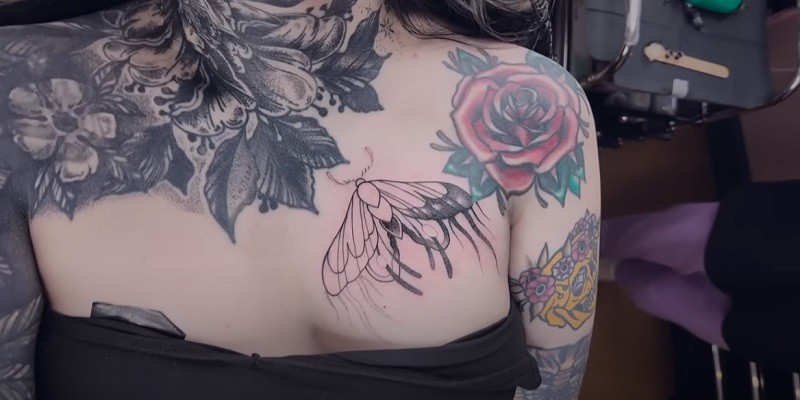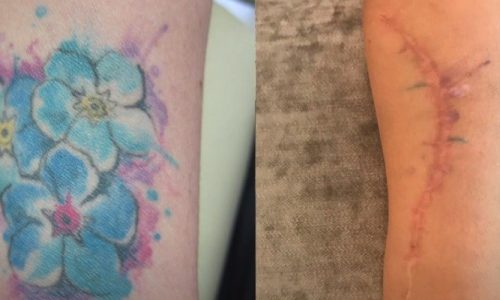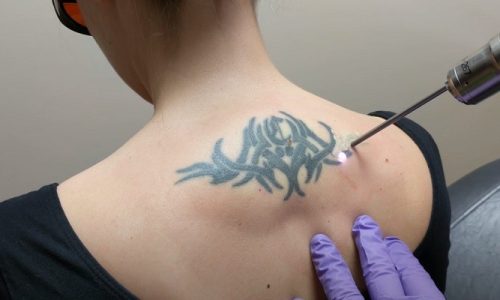Last Updated on June 18, 2025 by Jaclyn A. Neeley
Neosporin should not be used on a tattoo as it can make the skin more sensitive and lead to inflammation. It is important to avoid products like Neosporin, Triple Antibiotic, and CURAD on tattooed skin to prevent complications.

Credit: www.healthline.com
Can You Put Neosporin On A Tattoo?
When it comes to caring for a new tattoo, one question that often arises is whether or not it is safe to use Neosporin. Neosporin is a popular over-the-counter antibiotic ointment that many people reach for to treat minor cuts, burns, and scrapes. However, when it comes to tattoos, it’s important to exercise caution and avoid using Neosporin or similar products. Let’s delve into the reasons why and explore the best ointments to use on a new tattoo.
Why You Should Avoid Neosporin And Similar Products
Neosporin and other triple antibiotic ointments are not recommended for tattoo aftercare. These products contain ingredients that can be harsh on freshly inked skin. Neosporin and similar ointments can cause skin irritation, allergic reactions, and even interfere with the healing process of your tattoo. Additionally, they can create a moist environment that may promote the growth of bacteria and prolong the healing time of your tattoo. Therefore, it is best to steer clear of Neosporin and opt for other suitable tattoo aftercare products instead.
Best Ointments To Use On A New Tattoo
So, if Neosporin is off the table, what should you use on your new tattoo? There are several ointments that are recommended for tattoo aftercare. These include petroleum jelly, vitamin A and D ointment, and specialized tattoo aftercare products such as Hustle Butter Deluxe or Tattoo Goo. These ointments help protect the tattoo, keep the skin moisturized, and promote proper healing without potential side effects that may arise from using products like Neosporin.
The Effects Of Neosporin On Tattoos
If you mistakenly use Neosporin on your tattoo, it is important to be aware of the potential effects. Neosporin can cause the tattoo to become excessively dry, scabby, and even lose some color. It may also lead to itching, redness, and irritation. These effects can be detrimental to the overall appearance and longevity of your tattoo. Therefore, it is crucial to choose the appropriate aftercare products and avoid using Neosporin on your tattoo.
Expert Advice On Neosporin And Tattoos
If you’re still unsure about whether or not to use Neosporin on your tattoo, it’s best to consult with a professional tattoo artist or dermatologist for expert advice. They can provide personalized guidance based on your specific tattoo and skin type. Remember, everyone’s healing process may vary slightly, so it’s important to listen to the professionals and follow their recommendations to ensure the best outcome for your tattoo.
Read More – Does Shin Tattoo Hurt?
Proper Tattoo Aftercare
Neosporin is not recommended for tattoo aftercare as it can make the skin more sensitive and cause inflammation. It is best to use antibiotic ointment like Bacitracin or Vitamin A&D ointment to protect and heal your new tattoo.
Applying Antibiotic Ointment
One of the key steps in proper tattoo aftercare is applying the right ointment. However, it’s important to note that Neosporin, Triple Antibiotic, and CURAD should be avoided. While these products are designed for minor cuts, burns, and scrapes, they are not suitable for tattoos. They can make the skin more sensitive and lead to inflammation, hindering the healing process.
Other Care Tips For A New Tattoo
- Keep your tattoo clean: Gently wash your tattoo with mild, fragrance-free soap and warm water, around 2-3 times a day.
- Pat dry: After washing, carefully pat your tattoo dry with a clean, soft towel. Avoid rubbing or scrubbing.
- Moisturize regularly: Apply a thin layer of petroleum jelly or an ointment recommended by your tattoo artist to keep your tattoo moisturized. This helps prevent excessive dryness and cracking.
- Avoid direct sunlight: Protect your tattoo from direct sunlight and avoid tanning beds during the healing process. UV rays can fade the colors and damage the skin.
- Avoid scratching or picking: It is crucial to resist the temptation to scratch or pick at your tattoo, as it may cause scarring or infection.
Common Mistakes To Avoid During Aftercare
- Over-applying ointment: While keeping your tattoo moisturized is crucial, applying too much ointment can clog the pores and delay the healing process. Use a thin layer and follow your artist’s instructions.
- Using harsh products: Avoid using harsh soaps, creams, or lotions on your tattoo, as they can irritate the skin and slow down the healing.
- Submerging in water: Avoid swimming in pools, hot tubs, or baths during the early stages of healing to prevent infections caused by bacteria or chemicals in the water.
- Tight clothing or rough fabrics: Opt for loose, breathable clothing that won’t rub against your tattoo. Rough fabrics can irritate the skin and cause discomfort.
- Skipping touch-up appointments: If your tattoo artist recommends a touch-up session, make sure to schedule an appointment and follow their instructions for proper healing.
By following these proper aftercare tips, you can promote the healing of your tattoo and ensure that it looks vibrant and beautiful for years to come.
Read More – How Bad Do Shin Tattoos Hurt?
The Risks Of Using Neosporin On Tattoos
Using Neosporin on tattoos is not recommended as it can make the skin more sensitive and lead to inflammation. It’s best to avoid products like Neosporin, Triple Antibiotic, and CURAD in order to prevent any risks or complications.
Dangers Of Using Neosporin On Fresh Tattoos
Using Neosporin on a fresh tattoo can pose several risks that can hinder the healing process and potentially damage the ink. It is important to understand these dangers before applying any ointments or creams to your new tattoo.
Potential Damage To Ink And Healing Process
When it comes to fresh tattoos, the healing process is crucial for ensuring the longevity and vibrancy of the ink. Neosporin, Triple Antibiotic, and CURAD, although beneficial for minor cuts and burns, are not suitable for tattoo aftercare. These products can compromise the healing process and harm the tattoo by creating conditions for inflammation and causing the skin to become more sensitive.
Moreover, these ointments contain ingredients that can potentially damage or fade the ink. Neosporin and other antibiotic creams may disrupt the color pigments and interrupt the proper healing of the tattoo. Applying these products can lead to a loss of color saturation and clarity, jeopardizing the overall appearance of the tattoo.
Alternatives To Neosporin For Tattoo Aftercare
Now that you understand the risks associated with using Neosporin on tattoos, it’s important to explore alternative options for proper aftercare. These alternatives can help accelerate the healing process while preserving the integrity of the ink.
- Tattoo-specific aftercare ointments: There are numerous tattoo-specific ointments available in the market that are specifically formulated to aid in the healing of tattoos. These ointments are designed to keep the tattoo moisturized, protect it from bacteria, and promote the regeneration of healthy skin cells. Look for products that contain natural ingredients, such as beeswax or aloe vera, as these can provide soothing and nourishing properties.
- Petroleum jelly: A thin layer of petroleum jelly, such as Vaseline, can also be used as an alternative to Neosporin. Petroleum jelly acts as a protective barrier, keeping the tattoo moisturized and preventing scabs from forming prematurely. However, be cautious not to apply too much petroleum jelly as it can clog the pores and hinder the healing process.
- Coconut oil: Organic coconut oil is another excellent option for tattoo aftercare. It possesses antimicrobial properties that can help prevent infection, while its moisturizing qualities aid in the healing process. Apply a thin layer of coconut oil to your tattoo multiple times a day to keep it hydrated and supple.
- Tattoo artist recommendations: It’s always advisable to consult with your tattoo artist for their preferred aftercare methods. They have extensive experience in handling tattoos and can provide personalized recommendations based on your skin type and the tattoo’s specific needs.
Credit: www.reddit.com
Read More – What Does Cherry Tattoo Mean?
The Best Products For Tattoo Aftercare
Proper aftercare is crucial for maintaining the appearance and longevity of your new tattoo. One of the key aspects of tattoo aftercare is choosing the right products to promote healing and prevent infection. In this article, we will discuss the recommended ointments and creams for tattoos, the benefits of using specific aftercare products, and how to choose the right aftercare product for your tattoo.
Recommended Ointments And Creams For Tattoos
When it comes to healing tattoos, not all ointments and creams are created equal. Here are some of the top options for tattoo aftercare:
| Product | Description |
|---|---|
| Tattoo Goo Original | A popular choice among tattoo enthusiasts, Tattoo Goo Original is specifically designed to aid the healing process, providing moisture and protection to your tattoo. |
| Hustle Butter Deluxe Tattoo | Known for its all-natural ingredients, Hustle Butter Deluxe Tattoo is a vegan-friendly option that soothes and nourishes the skin, promoting faster healing. |
| Viking Revolution Tattoo Care | This ointment is formulated with natural butters and oils to moisturize and protect your tattoo, helping to prevent itching and dryness. |
| Malibu Tan Hemp Tattoo Enhancing | Enriched with hemp seed oil, this cream helps to hydrate and revitalize your tattoo, enhancing its color and vibrancy. |
Benefits Of Using Specific Aftercare Products
Using specific aftercare products for your tattoo can offer several benefits:
- Promote faster healing by providing essential nutrients and moisture.
- Prevent infection by creating a protective barrier against dirt and bacteria.
- Soothe itching and reduce discomfort during the healing process.
- Enhance the color and vibrancy of your tattoo, ensuring it looks its best.
- Minimize scabbing and peeling, leading to a smoother healing process.
Choosing The Right Aftercare Product For Your Tattoo
When choosing an aftercare product for your tattoo, it’s essential to consider factors such as your skin type, tattoo size, and personal preferences. Here are some tips to help you make the right choice:
- Consult with your tattoo artist for their recommendations on aftercare products.
- Read reviews and testimonials from other tattoo enthusiasts to gather insights.
- Consider your skin’s sensitivity and choose products with hypoallergenic properties.
- Look for products that are specifically formulated for tattoo aftercare.
- Avoid products with ingredients that can fade or damage the tattoo, such as Neosporin or triple antibiotic creams.
- Follow the instructions provided by the manufacturer and your tattoo artist for application and frequency of use.
By selecting the right aftercare product and following a proper aftercare routine, you can ensure that your tattoo heals beautifully and stands the test of time.
Expert Opinions And Recommendations
When it comes to tattoo aftercare, there are a lot of opinions floating around on what products to use and what to avoid. In this section, we’ll explore the expert opinions and recommendations from professionals in the industry, including tattoo artists and dermatologists. Let’s dive in!
What Professionals Say About Neosporin And Tattoos
Neosporin and other similar products are often used for wound care and as a general antibiotic ointment. However, when it comes to tattoo aftercare, professionals generally advise against using Neosporin on fresh tattoos.
Dr. Jagdeo, a renowned dermatologist, warns that using products like Neosporin, Triple Antibiotic, and CURAD on tattoos can actually lead to increased skin sensitivity and inflammation. While it may seem like a good idea to prevent bacteria from infiltrating the tattoo, these products can hinder the healing process and potentially cause unwanted complications.
Insights From Tattoo Artists And Dermatologists
Tattoo artists and dermatologists also echo the sentiment that Neosporin is not the best choice for new tattoos. While it may offer protection against infection, it lacks the necessary moisture to promote proper healing and doesn’t allow the skin to breathe.
A&D or Aquaphor are often recommended alternatives to Neosporin. These ointments provide the much-needed moisture for the tattoo to heal while still offering protection against infection. Additionally, they don’t carry the risk of color fading or other adverse effects on the tattoo. Tattoo artists often provide specific aftercare instructions, including the frequency of washing and ointment application, which may vary depending on the individual artist’s preferences.
Guidelines For Proper Tattoo Aftercare
Proper tattoo aftercare is crucial to ensure optimal healing and to maintain the longevity and vibrancy of the tattoo. Here are some general guidelines to follow:
- Leave the bandage on for the recommended time by your tattoo artist, usually a few hours.
- Gently wash the tattoo with lukewarm water and a mild, fragrance-free soap, using your clean hands.
- Pat the tattoo dry with a clean, soft towel. Avoid rubbing or scrubbing the tattoo.
- Apply a thin layer of antibiotic ointment, such as A&D or Aquaphor, to keep the tattoo moisturized and protected. Follow your tattoo artist’s instructions for the recommended frequency of application.
- Avoid picking, scratching, or exposing the tattoo to excessive moisture or sunlight during the healing process.
- Wear loose, breathable clothing to prevent friction and irritation on the tattooed area.
- Keep the tattoo clean and avoid submerging it in water, such as swimming or soaking in a hot tub, until it is fully healed.
- Consult your tattoo artist or a dermatologist if you experience any signs of infection, excessive pain, or prolonged redness and swelling.
By following these guidelines and avoiding products like Neosporin, you can ensure proper healing and protect the integrity of your new tattoo.
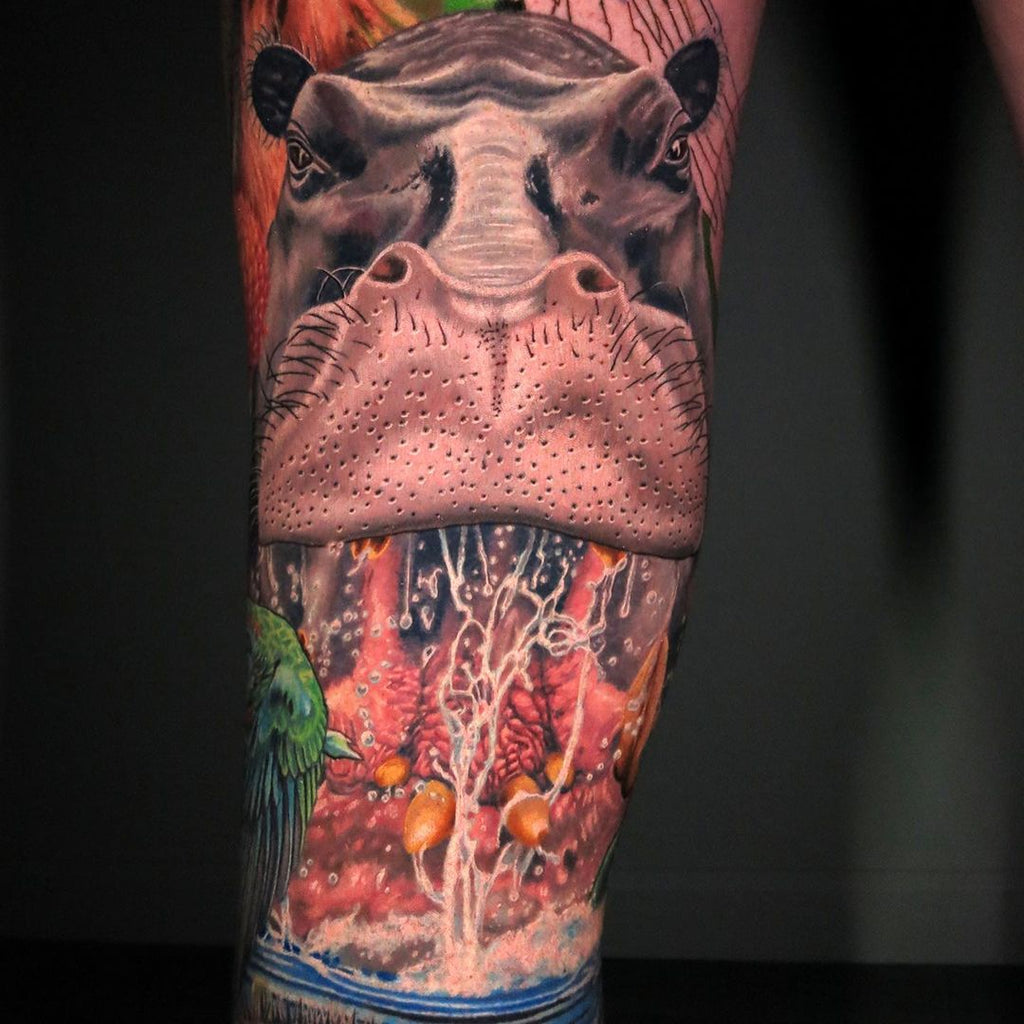
Credit: inkeeze.com
Frequently Asked Questions On Can You Put Neosporin On A Tattoo?
Why Can’t You Use Neosporin On Tattoos?
Neosporin shouldn’t be used on tattoos. It can make the skin more sensitive and cause inflammation. Avoid Neosporin, Triple Antibiotic, and CURAD to prevent bacterial infiltration and potential damage to the tattoo.
What Ointment Can I Put On My Tattoo?
Avoid using Neosporin on your tattoo. Neosporin and similar products can make your skin more sensitive and cause inflammation. Instead, use a thin layer of antibiotic ointment like Bacitracin or Vitamin A&D ointment to protect your tattoo as it heals.
What Is The Best Thing To Put On A New Tattoo?
Avoid using Neosporin on a new tattoo. Neosporin can make the skin more sensitive and cause inflammation. Use a thin layer of antibiotic ointment or petroleum jelly recommended by your artist to protect and heal your tattoo.
Can You Use Neosporin Instead Of Aquaphor For Tattoos?
No, it is not recommended to use Neosporin on a tattoo. Neosporin can cause sensitivity and inflammation, potentially affecting the tattoo’s color. It is better to use products like A&D or Aquaphor for tattoo aftercare.
Can Neosporin Be Used On A New Tattoo?
No, it’s recommended to avoid using Neosporin on a new tattoo as it can hinder the healing process.
Conclusion
Using Neosporin on a tattoo is not recommended. Although it may seem like a good idea to prevent bacteria, Neosporin can actually make the situation worse. Antibiotic ointments like Neosporin can cause skin sensitivity and inflammation, which is not ideal for healing tattoos.
It is best to follow the aftercare instructions provided by your tattoo artist and use a designated tattoo ointment that promotes healing without causing any harm to the tattooed skin.

